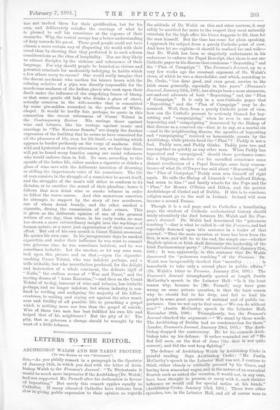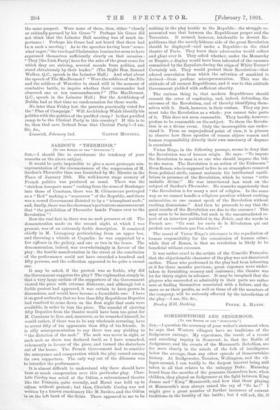LETTERS TO THE EDITOR.
.ARCHBISHOP WALSH AND HIS TARDY PROTEST.
[To THE EDITOR OF. TI1E " SPECTATOR."'
SIR,—As you pithily remark in a paragraph in the Spectator of January 24th, in which you deal with the letter of Arch- bishop Walsh to the Freeman's Journal : " To Protestants it would be much more impressive if the Archbishop [Dr. Walsh] had not supported Mr. Parnell after his declaration in favour of boycotting." But -surely this remark applies equally to Catholics. If many educated Catholics have hitherto been slow in giving public expression to their opinion as regards
the attitude of Dr. Walsh on this and other matters, it may safely be ascribed far more to the respect they most naturally entertain for the high office his Grace happens to fill, than for the man himself. But the time has come for plain speaking. I approach the subject from a purely Catholic point of view.
And here let me explain—it should be realised far and wide—
that Dr. Walsh has been so singularly unfortunate in his endeavour to enforce the Papal Rescript, that there is not one Catholic paper in his diocese that condemns " Boycotting " and the " Plan of Campaign " ! The Freeman's Journal, up to a very few weeks ago the constant exponent of Dr. Walsh's views, of which he was a, shareholder, and which, according to Dr. Croke, "' has done good, and even great, service to the Irish cause generally, especially in late years" (Freeman's Journal, January 24th, 1891), has always been a most strenuous, out-and-out advocate of both " Boycotting " and the " Plan of Campaign." It is only in a non-Catholic paper that " Boycotting" and the "Plan of Campaign" may be de- nounced. Well, then, from a purely Catholic point of view, how can the Catholic peasant be seriously blamed for boy- cotting and "campaigning," when he sees in one diocese boycotting and " campaigning " denounced by the Bishop of that diocese as a reserved sin—that is to say, as a mortal. sin —and in the neighbouring diocese the apostles of boycotting and " campaigning" received as honourable guests by the Archbishop, while priests head the " Plan " ? Paddy is not a fool. Paddy sees, and Paddy thinks. Paddy puts two and two together as quickly as any other man. When Paddy has boycotted and " campaigned," should there perchance come, like a blighting shadow o'er his unruffled conscience some distant recollection of a Papal Rescript, some hazy remem- brance of what Dr. O'Dwyer has said about " Boycotting " and the "Plan of Campaign," Paddy soon sets himself all right again. He calls the Bishop of Limerick " a landlord Bishop, bad saran to him " and lustily wheels for the Pope and the " Plan," for Messrs. O'Brien and Dillon, and the patriot Archbishops of Cashel and of Dublin. If this is to continue, religion must go to the wall in Ireland. Ireland will soon become a second France.
Though it is a sad page, and to Catholics a humiliating page, the student of Catholic ecclesiastical history should study attentively the duel between Dr. Walsh and the Free- man's Journal. Dr. Walsh had denounced the "poisonous teaching "—that is what he called it—of the Freeman, and had especially fastened upon this sentence in a leader of that journal : " That the main question at issue has been from the first, is now, and will be to the end, the simple one—whether English opinion or Irish shall determine the leadership of the Irish Parliamentary party." (Freeman's Journal, January 21st, 1891.) It was, apparently, in this sentence that Dr. Walsh discovered the "poisonous teaching" of the .Freeman. Dr.
Walsh was inexpressibly shocked that "morality is henceforth to take only a second place in public affairs." (Dr. Walsh's letter to Freeman, January 21st, 1891.) The Freeman's Journal triumphantly quoted at length Justin McCarthy's speech in the Leinster Hall : "Is it the least reason why, because he [Mr. Parnell] may have gone wrong on some private question, is that the least reason why he should fail in his duty, and fail to lead his people in some great question of national and of public im- portance. Can we not say to that man,—' We can do without you ?' " (Justin McCarthy, speech in the Leinster Hall, November 20th, 1890.) Triumphantly, too, the Freeman's Journal clinched the argument :—" We stand by those words. The Archbishop of Dublin had no condemnation for them." (Leader, Freeman's Journal, January 23rd, 1891.) The Arch- bishop dropped the controversy. He let his comrade Arch- bishop take up his defence. It rather reminded one of "Ho fled full soon, on the first of June [the date is not quite correct], and bid the rest keep fighting."
The defence of Archbishop Walsh by Archbishop Croke is painful reading. Says Archbishop Croke : "Mr. Justin McCarthy's speech in the Leinster Hall was not, I venture to think, either closely or critically perused by his Grace, and having been somewhat vague, and in the nature of an oratorical flourish such as suited the occasion, it would not, in any case, have been thought to possess, or oarry with it, such sinister influence as would call for special notice at his hands." (Archbishop Croke, January 23rd, 1891.) There were other speeches, too, in the Leinster Hall, and all of course were to
the same purport. Were none of them, then, either closely or critically perused by his Grace "P Perhaps his Grace did not think that the Leinster Hall meeting was of much im- portance I Perhaps his Grace had not heard that there had be nn such a meeting ! As to the speeches having been" some- what vague," the two legal Gladstonian luminaries seem to have expressed themselves sufficiently clearly on that occasion : " They [the Irish Party] have for the sake of the great cause for which they are striving, severed morals from politics, and stand chivalrously by their leader." (The Right Hon. Samuel Walker, Q.C., speech in the Leinster Hall.) And what about the speech of The MacDermot P " Were the soldiers of the Nile and the soldiers of Waterloo to stand still in the moment of combative battle, to inquire whether their commander had observed one or ten commandments ?" (The MacDermot, Q.C., speech in the Leinster Hall.) But the Archbishop of Dublin had at that time no condemnation for those words.
No later than Friday last, the patriots practically voted for the " Plan of Campaign," Will Archbishop Walsh identify his politics with the politics of the purified rump P Is that purified rump to be the Clerical Party in this country P If this is to
be, then God save Ireland from that Clerical Party am, Sir, &c.,











































 Previous page
Previous page